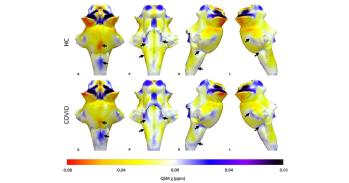A Cambridge professor and an army of ScienceGrrls – with a little assistance from the late Magnus Pyke – will be helping celebrate women in science, with the release today on iTunes of a cover version of Thomas Dolby’s 1982 hit She Blinded Me With Science.
A Cambridge professor and an army of ScienceGrrls – with a little assistance from the late Magnus Pyke – will be helping celebrate women in science, with the release today on iTunes of a cover version of Thomas Dolby’s 1982 hit She Blinded Me With Science.
It’s shocking that most of the faces at my level of career progression are male. Clearly women are being put off science somewhere along the way
Tim Bussey
The song is performed by Violet Transmissions, a band whose lead singer Tim Bussey is also Professor of Behavioural Neuroscience and a Fellow and Director of Studies in Natural Sciences at Pembroke College, University of Cambridge. Its video features a number of young women scientists including a material scientist, laser physicists and an epidemiologist. All proceeds from the song will go to ScienceGrrl, an organisation dedicated to celebrating and supporting women in science.
Thomas Dolby has himself offered his backing, providing samples from his original hit of British scientist and TV presenter Magnus Pyke, including his off-the-cuff remark “Yes, but as a known scientist, it would be surprising if a girl blinded me with science”.
Professor Bussey says: “In my field, neuroscience – and certainly in my lab – many of the best scientists are women, including my wife Lisa Saksida, with whom I run the lab. And as Director of Studies, I consistently find that many of the top candidates for admission at undergraduate level are women. So it’s shocking that most of the faces at my level of career progression are male. Clearly women are being put off science somewhere along the way. We’ve released this cover of Thomas Dolby’s hit as way of celebrating women in science and helping raise awareness of some of the issues they face.”
Through Both Eyes, a recent report from ScienceGrrl, highlighted some of the issues that face women in science and recommended steps that could be taken to address the problem of underrepresentation of women in leadership positions in science, technology, engineering and mathematics (STEM). Issues include cultural stereotypes which do little to encourage girls to consider a career in STEM subjects and undermine their achievements in the classroom. ScienceGrrl calls on the government and organisations in a position of influence to show leadership in areas of gender equality, careers advice and education.
Dr Anna Zecharia, Director of ScienceGrrl, said: We want everyone to feel empowered to reach their potential. Too often, cultural and social factors mean that girls and women start off on the back foot feeling unsupported and out of place. ScienceGrrl is about showcasing diverse role models, and the different faces of success. We want to show that science and engineering is for everyone and support those who already have a foot in the door. There is still a lot of work to do to bust open stereotypes and break down barriers, but it’s encouraging that researchers like Tim are taking a stand and helping raise the profile – and position – of ScienceGrrls."
Similarly, a report last year by the Wellcome Trust, the UK’s largest charitable funder of medical research, found that a lack of mentoring and career support along with a low number of female role models were cited as key factors that may be driving women in science to move away from academic careers earlier than men.
The University of Cambridge has recently joined a select group of universities with an institutional Athena SWAN Silver Award. The awards are bestowed in recognition of commitment to advancing women's careers in STEM employment in higher education and research.
Professor Anne Davis, Professor of Mathematical Physics and a Gender Equality Champion at the University of Cambridge, said: “The University is keenly aware of the need to retain women as they progress through their careers into senior levels. Back when I got my PhD I suddenly found myself as the most senior women in my subject in the UK.
“The situation is changing, but slowly and there is still a lot more we must do to change the thinking of both men and women, to foster female scientists and ensure those recruiting academics have the right skills. To be a world class University we must recruit and retain the best candidates - from every sector of society.”
The video, together with additional interviews with the ‘science grrls’ can be viewed online at www.sheblindedmewithscience.org.
The text in this work is licensed under a Creative Commons Licence. If you use this content on your site please link back to this page. For image rights, please see the credits associated with each individual image.





